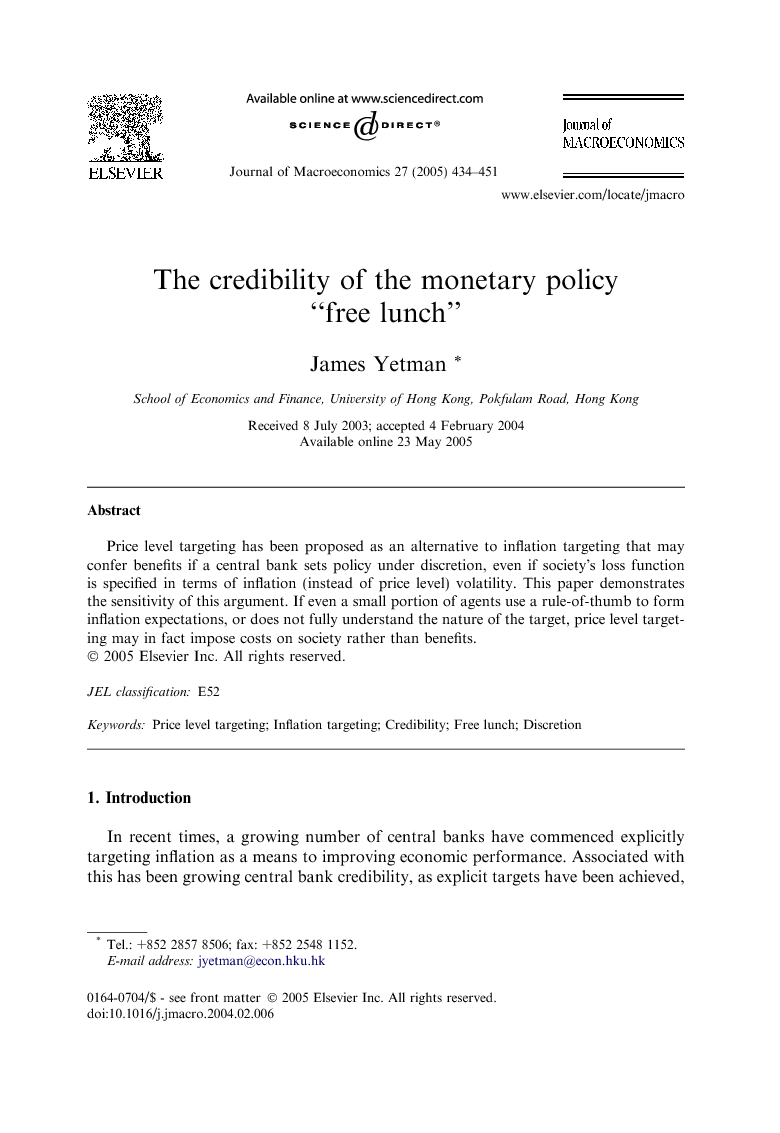Price level targeting has been proposed as an alternative to inflation targeting that may confer benefits if a central bank sets policy under discretion, even if society’s loss function is specified in terms of inflation (instead of price level) volatility. This paper demonstrates the sensitivity of this argument. If even a small portion of agents use a rule-of-thumb to form inflation expectations, or does not fully understand the nature of the target, price level targeting may in fact impose costs on society rather than benefits.
In recent times, a growing number of central banks have commenced explicitly targeting inflation as a means to improving economic performance. Associated with this has been growing central bank credibility, as explicit targets have been achieved, and deviations from the targets have been clearly articulated (see Bernanke et al. (1999) and Johnson (1998) for evidence of this).
Some have argued that central banks should go further. One characteristic of an inflation target is that past mistakes are ignored: if inflation lies above or below the target one period, the inflation target for the following period does not change. In a world in which there are nominal rigidities, optimal policy will generally include some degree of history dependence, so that current policy should condition on past mistakes.
One special case of a history dependent monetary policy that has received particular attention is price level targeting. Several recent papers have focused on the potential benefits of the central bank targeting the price level when the central bank operates under discretion, even if society’s loss function is specified in terms of inflation variability. Svensson (1999), using a Neo Classical Phillips curve, argued that there is an advantage to doing so provided the output gap is sufficiently persistent, and labeled this a “free lunch.” Others have found even stronger support for price level targeting when agents are forward looking. These papers utilize variants of the New Keynesian framework, outlined in Roberts (1995) and Clarida et al. (1999). This framework assumes that changing prices is costly, so prices that are set today reflect future expectations of inflation. For example, Dittmar and Gavin (2000) find that the inflation-output variability trade-off is better with a price level target than an inflation target. They argue that adding a price level target with a small weight has little cost in terms of the real side of the economy yet is beneficial in reducing inflation volatility.
Vestin (2000), using a similar framework, finds that price level targeting under discretion outperforms inflation targeting under discretion. In some cases, he finds that price level targeting under discretion can result in the same outcome as inflation targeting under commitment, provided the parameters of the loss function are suitably adjusted. In a related paper, Barnett and Engineer (2001) provide a summary of the literature and consider a hybrid New Keynesian–Neo Classical Phillips curve. They argue that optimal monetary policy precludes long-run price-level drift if inflation expectations are sufficiently forward looking, among other contexts.
The existing literature has assumed that agents are fully rational and that the central bank enjoys perfect credibility. Therefore whether a central bank has an inflation target or a price level target, agents are assumed to know the target, and form expectations that condition on it. Here the robustness of these results is considered. Suppose, for example, that constructing rational expectations of inflation requires substantial costs. Then a portion of economic agents may use rules-of-thumb to form expectations instead. Alternatively, suppose that agents do not know or believe the stated target of the central bank. They would then base their inflation expectations on a policy target that differs from the true target of the central bank.
A number of examples of rule-of-thumb forecasting and imperfect credibility are considered below. I find that in nearly all cases considered, the existing results are sensitive. As the assumptions in the existing literature are relaxed, the “free lunch” rapidly loses its culinary value, especially if inflation volatility has a high weight in society’s loss function. While the presence of rule-of-thumb forecasters or imperfect credibility is typically costly with either an inflation or a price level target, it is especially so with a price level target.
The basic model, demonstrating the potential role for price level targets, follows. Section 3 discusses history-dependent monetary policy; Section 4 considers the impact of rule-of-thumb forecasting, while Section 5 considers imperfect credibility. Conclusions then follow.
Price level targeting has been proposed as an alternative to inflation targeting that may confer benefits where a central bank operates under discretion, even if society’s loss function is specified in terms of inflation (instead of price level) volatility. This paper demonstrates the sensitivity of this argument to the expectations formation process of agents. If even a small portion of agents believes that inflation will continue in the future at current levels, or does not fully understand the nature of a price level target, price level targeting may in fact impose costs on society rather than benefits, especially if inflation volatility has a high weight in society’s loss function. While rational expectations and perfect credibility are generally beneficial with either a price level or an inflation target, an inflation target is more robust to alternative assumptions.
These results suggest that caution should be exercised in considering a price level target as the basis for monetary policy, unless society has preferences specified in terms of price level (rather than inflation) volatility.


